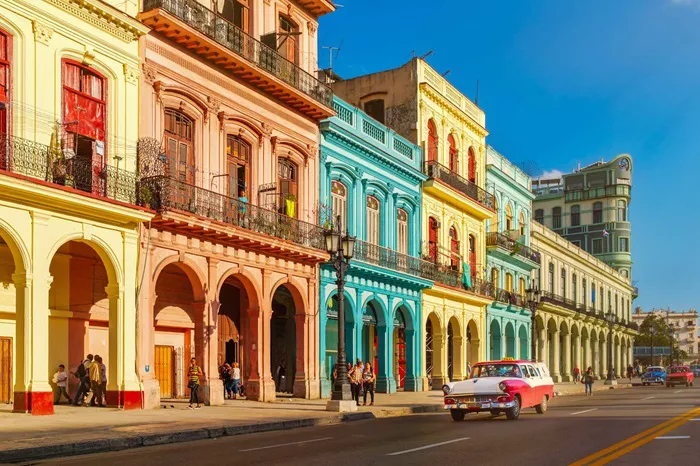As of October 2024, Cuba’s tourism industry has significantly underperformed, attracting just 2,490,770 international visitors. This figure is well below the revised goal of three million for the year, according to data from the National Office of Statistics and Information (ONEI). The report, titled “Arrival of Travelers. International Visitors, October 2024,” reveals that the current number of visitors represents only 96.1% of the total from the same period in 2023, marking a decrease of 101,256 visitors from the previous year.
Despite the challenges, there have been notable gains in certain markets, such as Canada and the Russian Federation. However, Cuba’s tourism sector continues to face significant obstacles, and the government has acknowledged that it is unlikely to meet its ambitious target for the year.
Challenges Contributing to Tourism Decline
Tourism Minister Juan Carlos García expressed concerns that the country’s tourism sector might fall short of its three-million-visitor goal in 2024. He pointed to a series of factors, including natural disasters like hurricanes and earthquakes, as well as the ongoing economic pressures imposed by the U.S. embargo. These issues have undoubtedly impacted the sector’s growth and hindered its ability to attract the expected number of foreign visitors.
In addition to these challenges, a report from the state-run website Cubadebate highlighted the broader struggles faced by the country’s tourism infrastructure, which remains unable to fully accommodate demand, despite improvements in some key international markets.
Areas of Growth and Success
On a more positive note, certain countries have shown marked growth in the number of visitors to Cuba. Markets such as Canada and the Russian Federation have experienced significant increases, with Canada seeing a 97.1% growth in visitor numbers, while Russia showed a 107% rise. Other countries also contributing to the influx of tourists include Mexico (103.7%), the Cuban diaspora (82.2%), and the United States (90.6%). Additionally, countries like Spain, Germany, France, Argentina, and Italy have shown moderate growth in visitor numbers.
These markets represent a bright spot in the country’s tourism outlook, especially considering the broader economic challenges. However, even with such increases, the total number of visitors has not met expectations, and experts caution that the sector must address underlying issues to achieve sustained growth.
The Strain on Cuba’s Hotel Infrastructure
Despite government claims of a robust hotel infrastructure boasting over 80,000 rooms, with 75% classified as four- or five-star accommodations, many of these rooms remain underutilized. Much of Cuba’s tourism-related investment is being funneled into expanding hotel capacity, but this expansion has not always translated into increased occupancy rates.
At least 18 international hotel chains, including nine from Spain, are involved in managing these properties. However, reports indicate that many hotels are not meeting the quality standards expected by tourists. In fact, some tourists have complained about the conditions of Cuban hotels, citing shortages of essential services. A Canadian travel agency even removed 26 Cuban hotels from its offerings due to poor facilities, further impacting the country’s tourism appeal.
Efforts to Boost Air Connectivity and International Partnerships
Cuba’s tourism industry has also sought to address air connectivity, which remains a crucial factor in attracting international tourists. The island is served by 57 airlines from 32 countries, and the Cuban government is working alongside the Cuban Civil Aviation Corporation to restore flight operations to pre-2019 levels.
Additionally, the government has introduced policies aimed at incentivizing airlines to operate more routes to Cuba. This is part of a broader effort to improve the country’s transportation infrastructure and make it easier for foreign visitors to travel to the island. There are also 24 joint ventures within the tourism sector focused on hotel and real estate development, with 15 of these ventures already undertaking investments to further expand the country’s tourism offerings.
Furthermore, Cuba has entered into 128 management and marketing contracts across various hotels, representing a total of 56,928 rooms, or about 65% of the country’s total hotel capacity. These initiatives have been designed to boost the tourism sector’s efficiency and attract more visitors.
Tourism Industry Faces Reality Check
Despite these efforts, Cuba’s tourism sector continues to grapple with several challenges. Reports from tourists over the past year highlight shortages in essential goods and services, making it difficult for Cuba to meet the expectations of its visitors. The poor quality of some hotel facilities, coupled with the ongoing economic constraints, has left many travelers dissatisfied.
While international markets like Canada and Russia are performing well, the country’s overall visitor numbers remain far below expectations, prompting concerns within the government about meeting future tourism goals. The issue highlights the broader economic challenges Cuba continues to face, particularly in the context of the U.S. embargo and the impact of natural disasters on the island’s infrastructure.
As Cuba moves forward into 2025, the government will need to address these structural issues in its tourism industry. This includes improving hotel quality, enhancing air connectivity, and creating a more stable economic environment that can attract international tourists. Without addressing these challenges, the country may struggle to achieve its long-term tourism objectives.
In conclusion, while certain markets have shown promising growth and there are efforts underway to bolster infrastructure and international connections, Cuba’s tourism sector has fallen short of its targets in 2024. The island’s ability to meet future visitor goals will depend on overcoming both external challenges and internal weaknesses, as the country works to reclaim its position as a leading tourist destination in the Caribbean.
Related topics:
- Ambitious Plans for a Third Menai Crossing Scrapped: The Impact on Anglesey’s Growth and Accessibility
- Chikkamagaluru District Advises Tourists to Delay Travel Plans Amid Heavy Rainfall
- International Airlines Reduce Flights to China Amid Russian Airspace Ban and Economic Concerns

